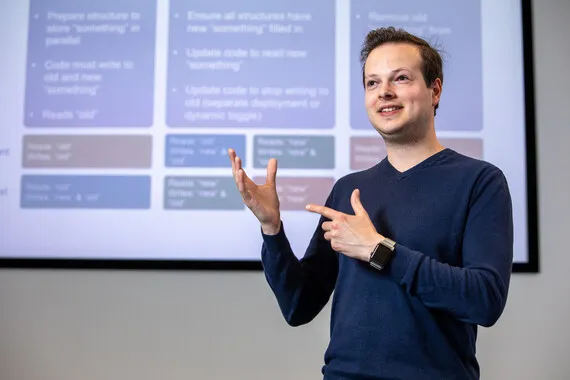course
Data Access with Entity Framework
Develop Data Access Applications using Microsoft Visual Studio and Entity framework
Description
In this training you will learn how to read data from a relational database using the Entity Framework, how to write it back after you have adjusted it. You get to know the Entity Framework thoroughly and among others you will learn to work with migrations, transactions and concurrency. The training will mainly use Entity Framework Core 6.0.
Learning Goals
For the above learning goals we use Bloom's Taxonomy
Prior Knowledge
- Basic knowledge of the Microsoft Visual Studio development environment.
- A basic understanding of Microsoft .NET Core
- Knowledge of C#.
- A good understanding of relational database concepts and the SQL language.
Subjects
Architecture and Data Access Technologies
- Mismatch between OO and Relational Model
- ORM
- Inheritance solutions:
- Table per Hierarchy
- Table per Type
- Table per Concrete Type
- Concurrency conflicts
- Indexes
Code First
- Fundamentals of Code First
- Workflow
- Conventions
- Data annotations
- Fluent API
- ConnectionString
- Data Seeding
Querying Entity Data
- LINQ
- IQueryable
- Logging
- Reverse Engineering and scaffolding
Loading Entities and Navigation Properties
- Loading related data:
- Eager loading
- Explicit loading
- Lazy loading
- Relationships
Code first migrations
- Entity Framework Tools
- Enabling migrations
- InitialCreate
- Performing migrations
- Update the database
Creating, Updating, and Deleting Entity Data
- Add a new item
- Update an item
- Delete an item
- Use Stored Procedures
- Filter queries
Working with object services
- DBContext
- ChangeTracker
- Asynchronous querying and saving
- Inject Services
Concurrency
- Concurrency problems
- Pessimistic vs. optimistic concurrency
- Resolving conflicts
- Transactional support
- Managing transactions
Testing
- Testing concepts
- Initialize
- In memory
NoSQL
- What is NoSQL?
- BASE
- Characteristics
- CosmosDB
- APIs
- Schema free
Improving Performance
- Asynchronous data modifications
- Change tracking
- Restriction on client evaluation
- DBFunctions
Additional features
- Table splitting
- Database scalar function mapping
- Keyless entity type
- Temporal tables
Read more
Schedule
| Start date | Duration | Location | |
|---|---|---|---|
January 26, 2026January 27, 2026January 28, 2026 | 3 days | Veenendaal / Remote This is a hybrid training and can be followed remotely. More information Veenendaal / Remote This is a hybrid training and can be followed remotely. More information Veenendaal / Remote This is a hybrid training and can be followed remotely. More information | Sign up |
February 11, 2026February 12, 2026February 13, 2026 | 3 days | Veenendaal / Remote This is a hybrid training and can be followed remotely. More information Veenendaal / Remote This is a hybrid training and can be followed remotely. More information Veenendaal / Remote This is a hybrid training and can be followed remotely. More information | Sign up |
March 9, 2026March 10, 2026March 11, 2026 | 3 days | Utrecht / Remote This is a hybrid training and can be followed remotely. More information Utrecht / Remote This is a hybrid training and can be followed remotely. More information Utrecht / Remote This is a hybrid training and can be followed remotely. More information | Sign up |
April 7, 2026April 8, 2026April 9, 2026 | 3 days | Veenendaal / Remote This is a hybrid training and can be followed remotely. More information Veenendaal / Remote This is a hybrid training and can be followed remotely. More information Veenendaal / Remote This is a hybrid training and can be followed remotely. More information | Sign up |
All courses can also be conducted within your organization as customized or incompany training.
Our training advisors are happy to help you provide personal advice or find Incompany training within your organization.
Trainers
Prior knowledge courses
"Trainer who knows his profession!"Marc
-
Hoge waardering
-
Praktijkgerichte trainingen
-
Gecertificeerde trainers
-
Eigen docenten








